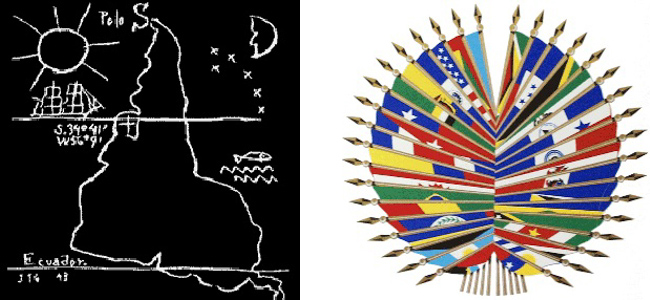
The Department of Anthropology is proud to have been the founding host department for the General Education Theme, "Las Américas," which today brings together an interdisplinary group of teacher-scholars from across the College of Arts and Sciences: Anthropology; Geography and Planning; Global Studies; History; Languages, Literatures, and Cultures; and Philosophy and Religious Studies. It is a unique and one-of-a-kind General Education Theme that gives students a comprehensive introduction to the histories, languages, cultures, and peoples of Las Américas.
This theme explores the diverse people, cultural legacies, and evolving realities in Latin America. Coursework explores the dynamic relationships, structures, values, and cultural manifestations through multiple disciplines. Although the course titles may suggest otherwise, we intentionally chose the theme title, "Las Américas," to signal that we do not intend to reproduce an "area" so much as to talk about the shared legacies of a hemisphere and we will be hammering home to students the porous nature of old colonial boundaries.
To learn more about this unique experience, please contact any of the themes faculty or your college advisor.
Anthropology. ANT 2300. Mesoamerican Cultures (3).S.
Introduction to the cultures and peoples of Mexico, Belize, Guatemala, and Honduras. Readings and lectures will focus on language, art, and political economy as vehicles for the expression of beliefs.
Geography and Planning. GHY 3014. Geography of Latin America (3).F.
This course stresses the diversity of physical environments, cultural traditions, and economic activities within Latin America and places special emphasis on the unique approaches that geographers bring to the study of this region. This course develops understanding of spatial patterns in Latin America through current readings, class discussions, lectures, slides, and videos.
Global Studies. GLS 3020: Cuba Libre: Perspectives on the Cuban Revolution (3). S.
This course will explore the Cuban Revolution from a variety of disciplinary perspectives, including history, political science, music, literature, film, and dance, while making connections to other post-colonial struggles in the Americas and beyond. Students will design their own research projects, integrating knowledge from different disciplinary approaches, and present their research at the semester's end using a variety of media.
History. HIS 2301. History of Colonial Latin America (3).F.
A survey of Latin America from the ancient Indian civilizations to the wars for independence. Topics include the ancient Maya, Aztec, and Inca indigenous civiliztions; the European discovery, conquest, and colonization of the New World; the colonial administration and exploitation of the Americas; and the independence movements which usher in the national period.
History. HIS 2302. History of Modern Latin America (3).S.
A survey of Latin America from independence to the present. Topics include the legacy of independence; the rise of the great dictators; causes of instability and social change; twentieth-century revolutions; and the effects of United States policy in the region.
Languages, Literatures, and Cultures. LLC 2040. Border Crossings: U.S. Hispanic Literature and Culture (3). F;S
This course explores the ethnic and cultural diversity of U.S. Hispanic literature and culture, as well as its historical, political, and ideological ties to Latin America. It's designed to highlight local to global connections and to provide a vantage point from which students can reflect on their own experiences and cultural identities. (Taught in English)
Philosophy and Religious Studies. REL 3100. Church and State in Latin America (3). S.
Christianity in Latin America takes several forms, most notably through the controversial movements involving liberation theology. This course will explore the relationship between Church and State in Latin America, treating religion as one component of a multi-disciplinary approach to the problems of poverty and social injustice both historically and contemporarily.